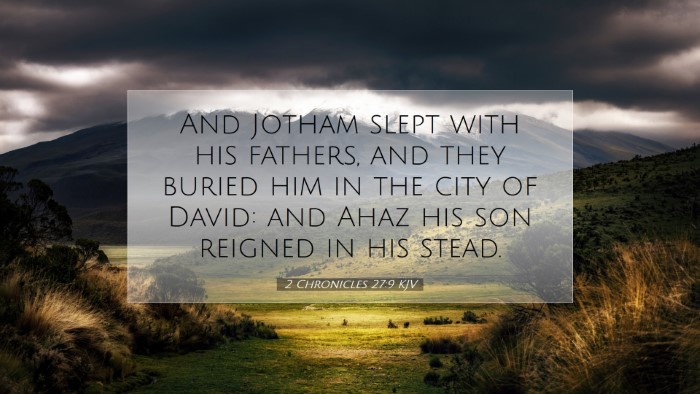Commentary on 2 Chronicles 27:9
Verse: "And Jotham slept with his fathers, and they buried him in the city of David: and Ahaz his son reigned in his stead."
General Overview
The reign of Jotham, though marked by his strengths and accomplishments, culminates in a transition that highlights the continuing lineage of David. 2 Chronicles 27:9 serves as a pivotal reminder of both the temporal nature of earthly reigns and the spiritual legacy that scriptures emphasize throughout the history of Israel's kings.
Death of Jotham
Jotham's death is significant in that it marks the end of a relatively stable period for Judah. Various commentaries note that Jotham was a king who did well in the sight of the Lord (see 2 Chronicles 27:2). His dedication to righteousness is underscored in contrast to the reign of his son, Ahaz, who would follow him and lead the nation into idolatry. This verse succinctly denotes the reality of human mortality and the succession that follows.
Insights from Matthew Henry
Matthew Henry observes the brevity of this statement regarding Jotham's death. In his commentary, he emphasizes that despite Jotham's good reign, he could not prevent the coming decline that Judah would suffer under Ahaz. Henry discusses the fact that a good man's legacy might be overshadowed by the failures of his successors. Jotham’s exemplary actions are noted, but the reader is led to understand how quickly the blessings of God can turn to judgments when righteousness is not sustained.
Reflections from Albert Barnes
Albert Barnes reflects on the nature of Jotham's rule and its conclusion. Barnes points out that the mention of Jotham being "buried in the city of David" indicates not only a physical resting place but also a spiritual significance. The "city of David" symbolizes a covenantal relationship with God, and although Jotham was a righteous king, the calamities that would befall the nation demonstrate the importance of continual faithfulness to God's commands. His assessment leads to a contemplation of legacy and the importance of lineage, highlighting that successive generations bear the weight of their ancestors' choices.
Perspectives from Adam Clarke
Adam Clarke emphasizes the political and spiritual context surrounding Jotham's reign and death. He notes that the stability Jotham brought made way for the harsher conditions that followed. Clarke stresses the notion of death as a transition; while personal and individual in nature, it also represents a broader narrative. The reign of Ahaz, outlined in Chronicles, serves as a stark contrast to the principles Jotham tried to uphold. Clarke encourages readers to reflect on leadership and its responsibilities as it affects not merely one's immediate circle but the nation and God's covenant people as a whole.
Spiritual and Theological Implications
The closing verse of Jotham’s reign prompts deeper theological reflection, as it does more than recount a historical account; it beckons believers to consider the nature of God’s covenant and the significance of leadership within it. The burden of nurturing faith and obedience to God is laid upon every leader, whether they are kings or contemporary pastors and teachers.
The Nature of Good Leadership
Good leadership, as portrayed in Jotham’s life, requires not just personal piety, but a commitment to leading others to follow God. The subsequent leadership of Ahaz serves as a critical reminder of the fragility of such devotion and the ease with which a nation can slip away from its spiritual foundations. Thus, understanding this continuum of leadership raises essential considerations for present-day church leaders and believers alike.
The Legacy of Jotham
Jotham’s legacy lies in his attempts to adhere to God’s statutes and the righteous principles he lived out. Yet, the realities of his successor remind us of the necessity for vigilance and continual prayer, that each generation remains steadfast in the ways of the Lord. The challenges faced in subsequent reigns showcase the ongoing battle against sin and idolatry that believers must engage with today.
Conclusion
In conclusion, 2 Chronicles 27:9 is a reminder of the delicate balance of leadership, legacy, and the faithfulness required from those who follow God. Reflecting on the insights provided by Matthew Henry, Albert Barnes, and Adam Clarke offers a multi-faceted view of Jotham's time, framing it within the broader narrative of Scripture—a clarion call for contemporary practitioners of faith to heed the lessons of the past as they lead future generations.


